|
|
|
Sort Order |
|
|
|
Items / Page
|
|
|
|
|
|
|
| Srl | Item |
| 1 |
ID:
165780
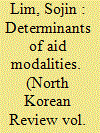

|
|
|
| 2 |
ID:
165781
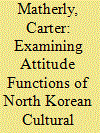

|
|
|
|
|
| Summary/Abstract |
Article Type: Research Paper Purpose—Functions of attitudes serve a critical role in the development of individual motivation and behavior. Attitudinal preferences can be manipulated through an idealized representation, such as a poster. The purpose of this research is to examine an example of North Korean cultural propaganda for symbolism intended to influence an observer's attitudes. Design, Methodology—A single poster with a plethora of symbolic representation was qualitatively examined through a psychological lens of attitude functions. Findings—The examination showed stark images and symbolism paint a compelling picture full of value-driven and defining notions in which each act to inform the observer's perceptions of their own selves. Attributes of the social identity of an ideal citizen through multiple life stages was derived. Practical Implications—Useful for policymakers and academics by offering insight into the social structure and symbolic importance that underpins North Korea. It also informs scholars on applied methods used by a government to shape a nation's cultural identity. Originality, Value—This is one of few articles to further propaganda research of North Korea. It may be the only article to apply a psychological lens of attitude functions to examine the said propaganda.
|
|
|
|
|
|
|
|
|
|
|
|
|
|
|
|
| 3 |
ID:
165779
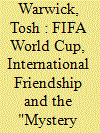

|
|
|
|
|
| Summary/Abstract |
Article Type: Research Paper Purpose:This article explores the evolution of international bonds between Middlesbrough in the northeast of England and North Korea arising from the participation of the North Korean men's football team at the 1966 FIFA World Cup. Shedding new light on the origins of this example of sporting diplomacy, this research seeks to understand the dynamics of international relations enacted at a local level and highlights the role of key individuals and institutions in facilitating this connection between the town and North Korea into the twenty-first century. Design, Methodology, Approach:Beginning with an assessment of early interactions between Middlesbrough and North Korea, this paper analyzes the way in which the relationship has been articulated and developed across several decades. Drawing upon local authority archives, historic newspaper collections, oral history and private collections, this study brings together hitherto underexplored resources, including North Korean diplomatic correspondence and interviews with the footballers of 1966, to deconstruct the multilayered mechanisms, meanings and motivations that underpin the Middlesbrough-Pyongyang relationship. Findings:Focusing chiefly on the role of British agency in North Korea-UK interactions, this research reveals the combination of local sporting conditions, international relations and individual and institution engagement in constructing bonds between Middlesbrough and North Korea since 1966. In doing so, the article draws out some of the peculiar local, economic and political factors that have shaped and nurtured the sporting, pseudodiplomatic connections between Pyongyang and Teesside. Practical Implications:This study highlights the important role that sport can play in harnessing new international interactions and understandings between peoples from different cultural and political systems. The power of football and bonds created at a local level (in this case Middlesbrough) to help nurture international diplomatic relations and embrace common transnational interests is also considered, as are the limitations of what might be considered a strand or extension of sports diplomacy. Originality, Value:Expanding beyond the existing literature on sports diplomacy, mega events and official interactions between North Korea and the UK, this article utilizes hitherto unpublished historical documentation and new oral testimony to bring a new perspective on the benefits and challenges posed by interactions across international borders facilitated by sport, both at the FIFA World Cup in 1966 and in recent decades.
|
|
|
|
|
|
|
|
|
|
|
|
|
|
|
|
| 4 |
ID:
165777
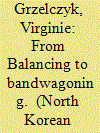

|
|
|
|
|
| Summary/Abstract |
Article Type: Research Paper Purpose—The DPRK has maintained an extensive array of foreign relationships over the past decades, both for political and economic gains. This article evaluates the impact of the current sanction regime on the DPRK's activities with African countries. Design/Methodology/Approach—The analysis is conducted by using a bespoke behavior framework based on Stephen Walt's "balance of threat" theory. This framework develops the concepts of balancing, defensive bandwagoning, and opportunistic bandwagoning as potential behaviors of African states following the imposition of United Nations Security Council Resolutions to sanction North Korea from 2006 until 2017. Findings—Evidence suggests that some long-standing relationships based on military and economic cooperation have been severed in recent years; thus, it supports a general balancing behavior. Findings also suggest that a specific group of countries subscribe to new opportunistic and defensive bandwagoning by embarking on talks and partnerships in the fields of health and science, regardless of the sanction regime, signaling defiance against a Western-led world order. Practical Implications—Patterns of rapprochements between North and South Korea and between North Korea and the United States have large implications for the potential removal of UNSCRs that paralyze North Korean foreign relations and slow its potential development. A clearer understanding of the DPRK's economic and market networks abroad, as well as potential political allies, can help differentiate between legitimate activities and illegal ones. hence, it allows a more informed approach to engage with the DPRK. Originality/Value—The article looks at the DPRK's relationships with countries that have often been ignored because they were not seen as important, given that North Korea was never expected to be successful in developing advanced military and nuclear technology. It is original as it looks at declassified official documents, official economic and military trade records and news archives, and presents an encompassing analysis of 51 African countries' relationships with the DPRK over time. The results of the study are valuable as they add to the understanding of the DPRK's foreign policy behavior, which is important given its potential nuclear status.
|
|
|
|
|
|
|
|
|
|
|
|
|
|
|
|
| 5 |
ID:
165782
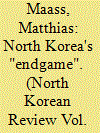

|
|
|
|
|
| Summary/Abstract |
Article Type: Commentary Essay Purpose—Much of the debate on North Korea assumes that Pyongyang would be truly satisfied with the overall status quo if it were only safe and secure enough. The purpose here is to argue that Pyongyang may instead be looking for reunification from a position of strength. Method—The short paper is built mostly on secondary-source research. It uses short historical case studies in addition to professional writings, both academic and journalistic. Findings—Overall, the argument is that Pyongyang has never abandoned the goal of unifying the peninsula under its own leadership. In fact, its "endgame" is a DPRK that spans the entire peninsula and unites the entire Korean people. Implications—To go forward and work with a nuclear North Korea towards a mutually agreeable long-term arrangement on the peninsula, understanding the long-term goals of Kim Jong Un is critical. The argument presented here may instill more caution in negotiation partners and statesmen/-women, especially in Seoul, Washington, and Tokyo, but also in Beijing and Moscow.
|
|
|
|
|
|
|
|
|
|
|
|
|
|
|
|
| 6 |
ID:
165778


|
|
|
|
|
| Summary/Abstract |
Article Type: Research Paper Purpose—As an authoritarian country that exercises rigid censorship, North Korea presents significant challenges to data-gathering for research in international relations. This paper aims to outline how source triangulation can help to overcome some of these challenges. Design, Methodology, Approach—This study draws on the author's observations of academic scholarship on North Korea that has been undertaken through the use of source triangulation. This study examines chronological data triangulation, perspectives-based data triangulation, and methodological triangulation as means of analyzing trends in the study of North Korea. Findings—Proper application of source triangulation as an instrument of research can enable scholars to find ways to circumvent some of the challenges in gathering data on North Korea. Although the author emphasizes that source triangulation should not be seen as a panacea, it does provide scholars with possible alternative lines of research inquiry. Practical Implications—Other scholars may find this text useful in planning their research strategy in undertaking scholarship on North Korea. Originality, Value—This paper builds on work by other North Korea scholars as well as the author's own experience in applying source triangulation as an instrument of social science research.
|
|
|
|
|
|
|
|
|
|
|
|
|
|
|
|
|
|
|
|
|